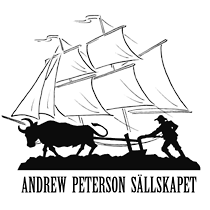Andrew was trusted as a mediator in his village when disaccord and conflicts arose between neighbours. One example of this role can be found in an excerpt from the preacher F. O. Nilsson’s diary – written on the 4th of April,1857 – which describes how Andrew intercedes when ‘Fischer the German’ and F.O Nilsson quarrel because F.O. Nilsson’s dog has injured Fischer’s sheep and one of his calves. An agreement about compensation was reached and one week later Andrew was asked to shoot Nilsson’s dog – which he consequently did.
Both Andrew and Karl Oskar were members of the jury. Here’s an excerpt from Andrew’s diary from the 16th of September, 1895: ”I was ordered to be juror in the grand jury, but was freed from it due to old age”. Another excerpt from Andrew’s diary from the 4th of October,1875 reads: Went to ‘Chaske’, since I had been ordered to sit as juror, but the Judge was dead so no jury assembled”.
Both Andrew and Karl Oskar helped build the parish chapel. An excerpt from Andrew’s diary – from the 13th of April, 1857 reads: “Today we had a ‘building-meeting’ about erecting the new chapel”.
Both Andrew and Karl Oskar exchanged favours and jobs with neighbours, like in this excerpt from Andrew’s diary– from the 30th of August, 1855: ”Laid out the foundation for my byre, Jonas Petter moved a Rock for me – I’ll work a day for him in return”. [I shall work a day at his house for that.]
Both of them worked especially hard during the first year of settling in the USA; for their preacher. The preacher of the parish in real life was F.O Nilsson. In the novels the name of this important person is ‘preacher Danjel Andreasson’. The preacher F.O Nilsson had been punished – and exiled from Sweden for his religious beliefs. In the novels, the preacher Danjel Andreasson has also been exiled from Sweden for his religious beliefs.
On th 27th of April,1858, Andrew reluctantly paid for an, in his opinion, overly expensive shipment of grafts to Carver – and also fetched a bag of flour for Abrahamsson and himself: “Was down in Carver to collect the box of grafts, Jonas Petterson was there too… had to pay 1 daler in shipping fee for the box, also Holm charged 40 cent for receiving and keeping the box, Voracious hounds. Brought back a sack of flour for me and Abrahamsson. The flour only costs 5 daler a barrel”. These events may have led Moberg to write about Karl Oskar carrying a bag of flour all the way home from Stillwater and almost dying of exhaustion because of it. Karl Oskar also bought his sack of flour for 5 dollars. The expression ”Voracious dogs” is aslo one that Moberg uses in the books.
Both Andrew and Karl Oskar often mended and patched up shoes and boots – both their own and other peoples’ boots and shoes.
In the novel, Kristina is given a sewing machine very early on, for a settler’s wife that is, the first sewing machines for domestic use came onto the market in 1856. Else and Andrew ordered a sewing machine (årdrade en symaskin) on the 5th of January, 1880.
Both Andrew and Karl Oskar were ”examined by the Doctor” – to see if they were ”fit for military service” and ready to enlist in the Union army. They were both both rejected. An excerpt from Andrew’s diary on the 19th of January, 1865 reads: ”The Seargent wrote an affidavit saying that I was too old to enlist in the army”. [to old to go to war]“.
Andrew’s diary, the 21st of October, 1867: “Was at Anders Åkansson’s and watched over his wife since she was out of her mind”. In the novels, Karl Oskar tries to help out – and talk to Anders Månsson on the day his Mother Fina-Kajsa dies, and Anders “goes out of his mind”.
Both Andrew and Karl Oskar built coffins for friends, family and neighbours.
Andrew meticulously recorded events in his diary as an aid to memory – Karl Oskar did the same – but used a calendar instead of a diary.
You can read about other affinities in our pamphlet: ”Andrew Peterson, the model for Karl Oskar – 100 similarities”.
Copyright Andrew Petersonsällskapet
